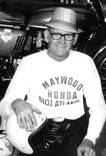 Robert Owens Bates started Bates Motor Scooter Service in 1939. The company later published a catalog featuring motorcycle accessories and apparel, and became a pioneer in the aftermarket industry that helped foster the motorcycling community’s affinity for customization. Bates also provided volunteer first aid and ambulance service for local races when none previously existed.
Robert Owens Bates started Bates Motor Scooter Service in 1939. The company later published a catalog featuring motorcycle accessories and apparel, and became a pioneer in the aftermarket industry that helped foster the motorcycling community’s affinity for customization. Bates also provided volunteer first aid and ambulance service for local races when none previously existed.
Bates Motor Scooter Service opened in March 1939 in Los Angeles. Bates’ shop became the warranty service provider for the local Powell Motor Scooter distributor, and he did all the work himself. Satisfied customers returned to his shop after the warranty period expired and he retained their business. In the fall of 1939 Bates built and installed a scooter windshield for a customer. The customer was so pleased that he showed it to the distributor. The distributor then ordered six windshields for immediate delivery.
In the spring of 1940 Bates Motor Scooter Service outgrew its original location and relocated to a larger shop. Shortly thereafter, World War II broke out. When the shortage of parts and materials forced Bates to close the shop, he moved his equipment into the garage at his home.
Deferred from military service due to a medical condition, Bates took a night job with Lockheed Aircraft Company and continued to operate his business from his home during the day. He discontinued the scooter repair work and retail parts sales, but continued manufacturing windshields. He would comb the town in search of metal for brackets and supports for the windshields, but the supply of materials eventually disappeared as it was diverted to the war effort. Not about to let this stop his business, Bates obtained some plastic rod, made a cutter for it, and cemented it to the edge of the plastic on the windshield. The improvisation turned out to be so successful that Bates had a die made for a plastic extrusion part with a slot in it. He applied for a patent for the manufacturing of the part and was granted U. S. Patent #2564800.
Bates continued to spend evenings and weekends producing windshields in his garage and added employees as orders increased. In 1945 he printed his first catalog flier, which displayed five different windshields for motorcycles and motor scooters. In 1946 he offered 13 windshields. As his business increased he moved out of his garage and into a building on Alameda St. in Los Angeles.
In 1947 Bates introduced a line of accessories for the Indian motorcycle that included nine windshields and a luggage rack.
In 1948 he created an illustrated flier featuring Cushman scooter accessories: windshields, a tandem seat, a new style of rear bumper, a front bumper, buddy grips and seat covers. In October of that year, he printed his first complete catalog: 14 pages of accessories for Wizard Bikes, Harley-Davidson, Indian and English motorcycles, Cushman scooters, Salsbury scooters and Moto Scoot scooters. The catalog also displayed Bates’ own motorcycle saddle, pillion seats, luggage racks, saddle covers and more.
In 1952 Bates began attending motorcycle races. The events were held out in the country and he observed that no one was designated to assist with the injured, nor were there any medical facilities. He bought a Ford station wagon, had it painted bright red, and purchased a stretcher at a war surplus store. He then took a first-aid course and asked the sewing department at his shop to convert an old briefcase into a first aid kit. From then on he attended race events every Sunday, assisting the injured while making contacts and surveying the scene for potential new accessory needs for motorcyclists.
In 1957 Bates expanded his shop and purchased adjacent properties. The Bates Manufacturing Company was incorporated and on July 1, 1958, the operation was renamed Bates Manufacturing, Inc. Bates’ son, Robert Bates, Jr., who worked in the business as a saddlemaker and leathercutter, was named vice president.
According to Bob Rudolph, who purchased Bates Manufacturing from Bates in the late 1950s and renamed the company Bates Industries, Bates' early innovation and business relationships established the foundation that helped the firm thrive when it began manufacturing the popular Bates colored racing leathers that most people remember today.
"Robert Bates founded the company in a 600 square-foot garage, and from there it grew into a business that had a reputation for quality jackets, pants, aftermarket seats, a popular headlight, windshield, fairings and saddlebags," Rudolph remembered. "He also had a strong rapport with the dealers, and he stayed with the firm to help manage our dealer network after I purchased the company. Bates was a true pioneer in the motorcycle accessory industry.”
Bates was inducted into the AMA Motorcycle Hall of Fame Museum in 2009.